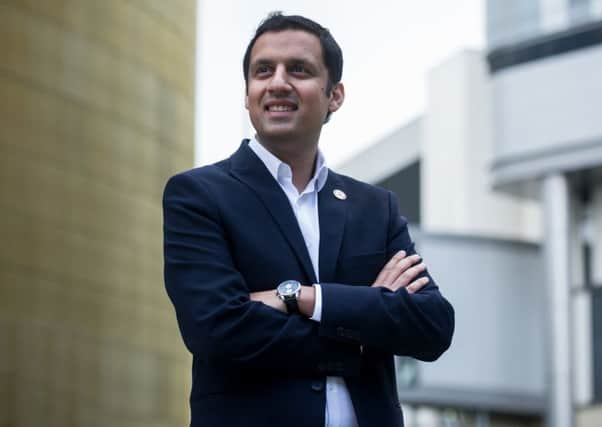Euan McColm: Too many of Jock Tamson's bairns are racists


We spoke of P***s and Ch***ies as if this was perfectly normal. Of course, it was not and, though I’d realised by my teens that this sort of thing was not on, it’s important to remember just how easily a child can by influenced by the hateful language he hears.
When the Labour MSP Anas Sarwar last week revealed that, during his recent unsuccessful campaign to become leader of his party, he had been told by a senior councillor that Scotland wasn’t ready for a “brown Muslim P***” as a political leader, colleagues and opponents alike were quick to offer solidarity. There was no place in Scotland, they said, for this prejudice.
Advertisement
Hide AdAdvertisement
Hide AdAnd the sentiment was true. Sadly, however, this prejudice long ago found its place and it is proving more resistant to eviction than we might have hoped.
One of the comforting things we Scots tell ourselves about ourselves is that we are tolerant and open. We’re all Jock Tamson’s bairns, we say.
Yet Sarwar’s experience – and the experience of many more Scots of Asian descent – suggests white Scots have become somewhat complacent when it comes to the matter of racial equality.
In the aftermath of the interview in which he described his experiences, Sarwar said he had been “inundated with heartbreaking individual stories”.
He heard from a young woman whose hijab was ripped off her head at an underground station, from a child scared to go to school because classmates taunt him that he’s a terrorist, and from a hotel worker regularly abused but told by the boss that the “customer comes first”.
These, among countless other stories, should shatter the notion – if it still lingers – that Scotland is uniquely open-minded when it comes to issues of race. They should – in fact, they must – provoke us to do better.
Last week, Sarwar was among those launching at Holyrood the new Cross Party Group on Tackling Islamophobia. All parties in the Scottish Parliament and more than 50 organisations have committed their support. Some of the statistics provided by researchers working for the group show just how timely its formation is.
Police Scotland, for example, has the fourth highest number of recorded Islamophobic hate crimes of all the police authorities across the UK. And if that’s not enough to convince you that Scotland has an ongoing problem, how about the deeply troubling fact that almost half of Muslim children fear going to school on the day after a terrorist attack? Surely that devastating statistic tells us not only that the problem exists but that racist views are being blithely handed on to children.
Advertisement
Hide AdAdvertisement
Hide AdDuring the 2016 EU referendum campaign, senior leave campaigners indulged in some appalling dog-whistle politics. The subtext of much of the “debate” about immigration was that until the UK left the European Union, we would be forced to continue to accept the wrong kind of incomers.
Perhaps you recall that awful “breaking point” poster in which an image of Syrian refugees – people fleeing for their lives – was used to suggest the UK was being deluged by freeloaders (and brown-faced ones, at that)?
The effectiveness of this sort of campaigning told us that the UK has not come as far as we might have thought. It told us that good old-fashioned racism was alive and well.
Writing in the New Statesman magazine last week, Sarwar stated that progress had been made. He recalled being assaulted in 1997 because of the colour of his skin and added: “I think we have moved on incredibly from that time”.
But the charge he then made – that everyday racism and Islamophobia has now become more insidious and institutionalised – has a bleak clang of truth.
First Minister Nicola Sturgeon spoke in Holyrood on Thursday about Sarwar’s bravery in describing his experiences. Members of all parties applauded as she said Holyrood should be united in fighting racism.
But while this was a welcome demonstration of leadership, there’s still a lot to be done.
I began this column by remembering the casually racist language I heard so often during my childhood.
Advertisement
Hide AdAdvertisement
Hide AdIt did not, I hope, play much of a part in shaping the sort of adult I became, but I saw in others how the language they heard at home became the catalyst for more aggressive behaviour. I saw friends of Asian heritage abused and attacked and, though I found these incidents appalling, they were hardly surprising. If we raise children to think that others are profoundly different then of course many of them will take that to a dark conclusion.
If Sarwar is right (and I fear he is) and racism has become more invidious and institutionalised, then we need to see more done in Scotland’s schools to tackle prejudice.
I hope this is something the new Cross Party Group will look at. Yes, it’s great that political opponents and civic Scotland are coming together to try to make a difference, here, but statements of intent and warm words about inclusivity are not, in themselves, a solution.
My children go to a primary school with a most diverse group of kids. Their mates come from families with – among others – Indian, Mexican, Thai, and Pakistani heritage.
But, though this is undoubtedly a good thing, this diversity does not mean that the poison of racism doesn’t lap around.
My kids – your kids – are vulnerable to being influenced by the things they hear from others. Too often, I fear, what they hear are the sort of views I thought had been left in the past.
Anas Sarwar deserves our admiration for bravely speaking up on this issue. But his words will be far more effective if they’re accompanied by action from those politicians who have declared they stand with him.